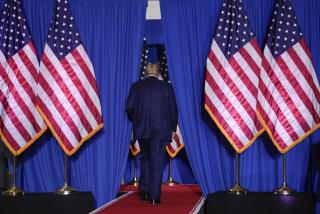The White House press briefing, always a spin zone, is now approaching uselessness

Reporting from Washington — The White House press briefing reached an ignominious milestone this week when a spokesman stood before reporters aboard Air Force One, read a series of prepared statements, then refused to take on-the-record questions during one of the newsiest days of the Trump presidency.
The briefing for decades has been a mix of spin and information. But under President Trump, a practice established to keep the public informed and the president accountable has increasingly failed to do either, according to academic experts and current and former journalists.
“The briefing is just unrecognizable from the days when it was a very useful tool,” said Ann Compton, a former ABC News correspondent who covered seven presidents over a 40-year span from Gerald Ford to Barack Obama.
Concern over the demise of the briefing began before Trump was elected, part of a general concern about administrations trying to bypass the news media. President Obama, for example, drew criticism when he hired an official videographer who reporters feared might substitute for news cameras.
Trump, however, has accelerated the trend with a stream-of-consciousness Twitter feed that reaches more than 44 million accounts, open attacks on the news media and an administration that has been in a defensive posture since its beginning.
Add to that a media built around confrontational moments, where reporters are rewarded for dramatic face-offs that are often devoid of traditional news value.
“The briefing has become a battleground, not a place for public education or enlightenment or even the discussion of basic information,” said Ken Walsh, who has covered six presidents for US News & World Report and written eight books on the presidency.
Concern over how the Trump White House would use the press briefing began on the first full day of his presidency, when then-Press Secretary Sean Spicer, defying evidence, declared Trump’s inauguration audience had been the biggest in history and lashed out at reporters who accurately reported that it had drawn a smaller crowd than prior ceremonies.
Spicer’s replacement, Sarah Huckabee Sanders, has pushed the briefing toward implausibility in other ways in recent weeks and has sharply limited the opportunity for public questioning of administration decisions.
Last Thursday, for example, was the first on-camera briefing since Trump had retweeted inaccurate and inflammatory anti-Muslim videos from a British extremist group. At the same time, Secretary of State Rex Tillerson was the subject of intense speculation over his future, the Senate was finishing work on a massive tax bill, and the administration was contemplating recognizing Jerusalem as Israel’s capital, rattling the Middle East.
The briefing that day lasted fewer than 20 minutes, seven of which were taken up by an appearance from the acting secretary of Health and Human Services, who talked about Trump donating his quarterly salary to combating opioid abuse.
When reporters did get a chance to ask Sanders whether Trump’s tweets of the misrepresented videos risked inciting anti-Muslim violence and elevating a fringe political group, she gave a memorable response:
“What he’s done is elevate the conversation to talk about a real issue and a real threat, and that’s extreme violence and extreme terrorism,” she said.
In other recent briefings Sanders told reporters that it was “highly inappropriate” to question a story from Trump’s chief of staff, John F. Kelly, because he has served as a four-star Marine general and that the sexual misconduct accusations against Democratic Minnesota Sen. Al Franken and Trump differ because “Franken has admitted wrongdoing and the president hasn’t.”
Kathleen Hall Jamieson, author of the book “Packaging the Presidency,” said the briefing is failing to elevate discourse at almost every level, much less provide the public with context about White House decisions.
“What you’re essentially watching is the art of deflection, the art of rationalization,” said Jamieson, director of the Annenberg Public Policy Center at the University of Pennsylvania.
She said the closest analog is the Nixon administration after the Watergate break-in, when officials offered evasive answers to nearly every question from an increasingly aggressive press corps.
Sanders said the press shares the blame.
“There is a big difference between not getting information and the press using the entire briefing time to ask the same two or three questions over and over and being upset that the answers don’t change no matter how many times they ask it,” she wrote in an email.
“There might be more information and more substance if there was a greater variety of questions asked by the press, and if they actually centered on something the American people care about like the economy, national security, etc.”
She noted accurately that Trump has been more accessible than his recent predecessors and provides on-the-record information frequently. She also pushed back at the suggestion that the White House speaks falsely.
“We believe the truth is fundamental and to suggest otherwise is outrageously insulting,” she said. “Have you asked any of your colleagues who have published inaccurate stories this question as well?”
Compton said that while the Trump administration with its declared war on the press shoulders much of the blame for pushing the briefing toward irrelevance, the shift to live television and the realization from reporters, beginning decades ago, “that this was a stage every day” have also contributed.
Several reporters for relatively small news outlets have landed cable news contracts following viral exchanges with Spicer, Sanders or both.
Walsh, in an email, called the briefing “an artifact of an era when presidents and White House officials thought they had a duty to keep the country informed through the media, and they attempted to answer the media’s questions in good faith.”
“No one gains from the current situation,” he wrote.
Twitter: @noahbierman
ALSO
Rep. John Conyers, most senior member of House, resigns amid accusations of sexual harassment
Climate scientists see alarming new threat to California
Immigration enforcement under Trump: Fewer people caught at border, more arrested inside the U.S.
More to Read
Get the L.A. Times Politics newsletter
Deeply reported insights into legislation, politics and policy from Sacramento, Washington and beyond. In your inbox three times per week.
You may occasionally receive promotional content from the Los Angeles Times.











